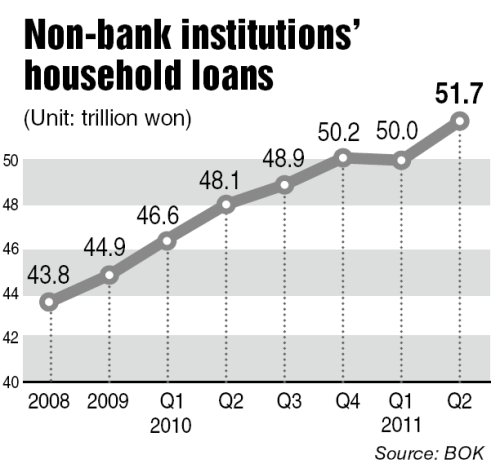Non-banking institutions’ household loans on the rise
By Korea HeraldPublished : Nov. 8, 2011 - 17:34

The portion of non-bank institutions’ home loans out of their total lending reached 51.7 percent in the April-June period, up from 50 percent tallied in the first quarter, according to data by the Bank of Korea.
The second-quarter figures marked the highest level since the first quarter of 2008 when the central bank began to compile related data.
As of end-June, loans provided by non-bank institutions amounted to 335.6 trillion won ($300.5 billion), out of which their household lending came in at 173.6 trillion won.
The weight of household loans stayed below that of corporate lending until the third quarter of last year, but it rose to 50.2 percent in the fourth quarter of 2010, surpassing the portion of corporate loans for the first time.
A pickup in non-bank institutions’ home loans came as local savings banks have been teetering from soured construction loans, making them turn their eyes toward household lending for survival, experts say.
The data came as South Korea is struggling to curb growing household debt, which stood at 876 trillion won as of the end of June.
Rising household debt is feared to constrain people’s room to spend, hurting economic growth. The Korean economy grew 0.7 percent on-quarter in the third quarter, the slowest in three quarters, on weaker consumer spending and faltering facility investment.
Despite the regulator’s steps to stem household debt, unveiled in June, the growth of household debt accelerated in July and August on the back of solid lending by non-bank institutions.
A steady rise in non-bank institutions’ household loans is feared to hurt the Korean household’s capacity to service debt as such lending is usually tied to higher interest rates.
The BOK said in its recent semi-annual financial stability report that the quality of household debt structure is growing vulnerable as such indebtedness has recently been driven by non-bank financial institutions and low-income borrowers.
(Yonhap News)
-
Articles by Korea Herald










![[Hello India] Hyundai Motor vows to boost 'clean mobility' in India](http://res.heraldm.com/phpwas/restmb_idxmake.php?idx=644&simg=/content/image/2024/04/25/20240425050672_0.jpg&u=)









